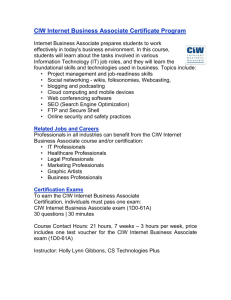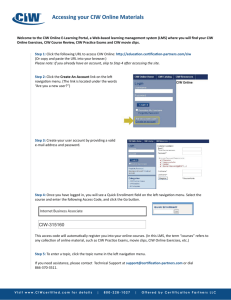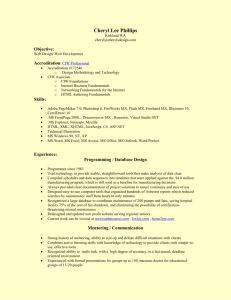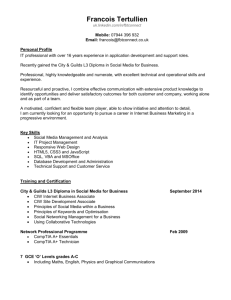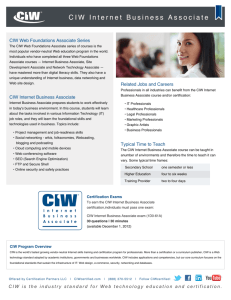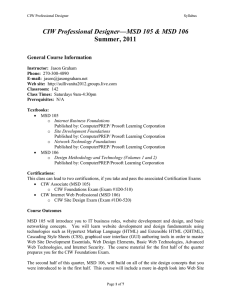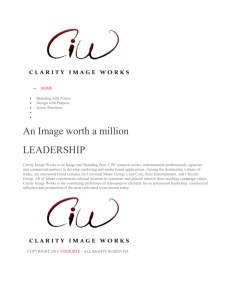Weekly Dates
advertisement
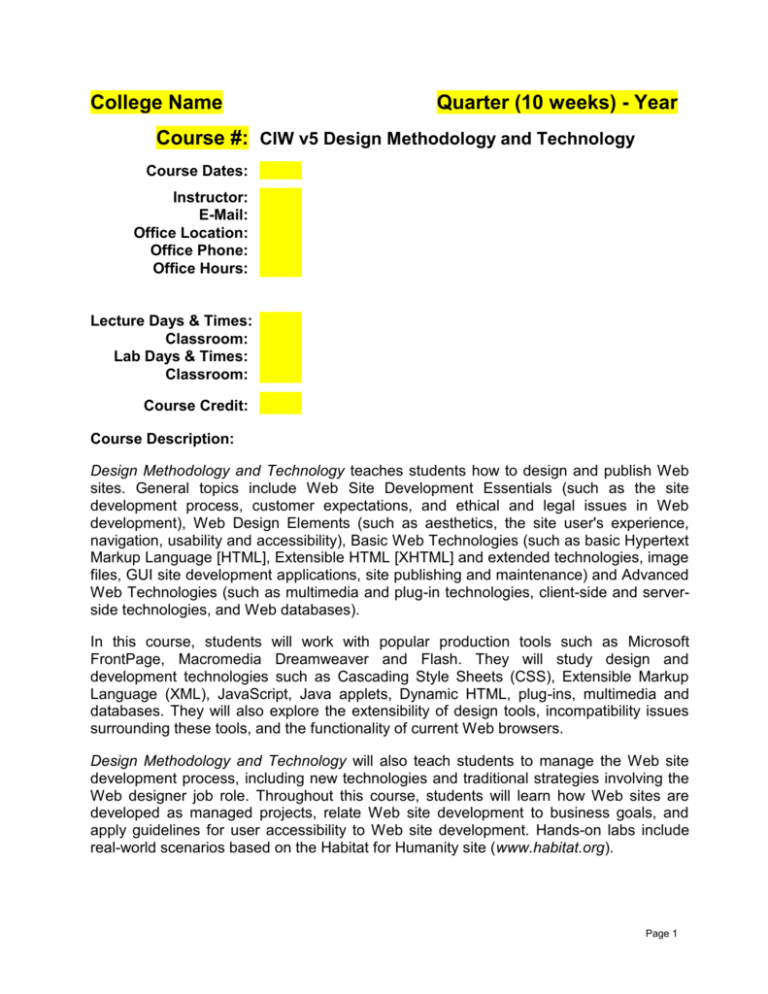
College Name Quarter (10 weeks) - Year Course #: CIW v5 Design Methodology and Technology Course Dates: Instructor: E-Mail: Office Location: Office Phone: Office Hours: Lecture Days & Times: Classroom: Lab Days & Times: Classroom: Course Credit: Course Description: Design Methodology and Technology teaches students how to design and publish Web sites. General topics include Web Site Development Essentials (such as the site development process, customer expectations, and ethical and legal issues in Web development), Web Design Elements (such as aesthetics, the site user's experience, navigation, usability and accessibility), Basic Web Technologies (such as basic Hypertext Markup Language [HTML], Extensible HTML [XHTML] and extended technologies, image files, GUI site development applications, site publishing and maintenance) and Advanced Web Technologies (such as multimedia and plug-in technologies, client-side and serverside technologies, and Web databases). In this course, students will work with popular production tools such as Microsoft FrontPage, Macromedia Dreamweaver and Flash. They will study design and development technologies such as Cascading Style Sheets (CSS), Extensible Markup Language (XML), JavaScript, Java applets, Dynamic HTML, plug-ins, multimedia and databases. They will also explore the extensibility of design tools, incompatibility issues surrounding these tools, and the functionality of current Web browsers. Design Methodology and Technology will also teach students to manage the Web site development process, including new technologies and traditional strategies involving the Web designer job role. Throughout this course, students will learn how Web sites are developed as managed projects, relate Web site development to business goals, and apply guidelines for user accessibility to Web site development. Hands-on labs include real-world scenarios based on the Habitat for Humanity site (www.habitat.org). Page 1 Prerequisites: Required Text: Design Methodology and Technology Published by: ComputerPREP/Prosoft Learning Corporation Certifications: To earn the CIW Professional designation, students must pass the CIW Foundations 1D0-510 certification exam and the CIW Site Designer 1D0-420 or 1D0-520 certification exam. To earn the Master CIW Designer designation, students must pass the CIW Foundations 1D0-510, the CIW Site Designer 1D0-420 or 1D0-520, and the CIW E-Commerce Designer 1D0425 or 1D0-525 exams. All CIW exams are administered by Prometric Inc. or VUE. To register for a CIW exam online, visit Prometric at www.2test.com/ or VUE at www.vue.com/. For more information about CIW exams, visit www.CIWcertified.com/. Practice Exams: Official CIW AssessPREP Tool: Students and instructors can instantly evaluate the level of IT knowledge achieved using ComputerPREP's official CIW AssessPREP tool. AssessPREP provides students with an additional method of review and assessment to enhance the learning experience. AssessPREP can also be used as a preassessment, practice exam and quiz administration tool to help instructors evaluate their students’ knowledge. AssessPREP allows students and instructors to: Pre-assess aptitudes, then tailor courses accordingly. Prepare for certification exams. Instantly evaluate course knowledge. Review materials in testing or study environments. AssessPREP does more than provide questions and answers. Some unique features of AssessPREP include: Multiple study modes for adaptive learning. Personalized study plans and progress reports. Study questions and reference tools. Simulations of actual testing environments. References to ComputerPREP course content. Page 2 Visit www.ComputerPREP.com/catalog/assessprep.asp or call (602) 275-7700 for product and purchase information about currently available CIW AssessPREP tools. Official Practice Exams (through CIW authorized partners only) The Master CIW Designer Exam Study Bundle is available to help candidates prepare for the CIW E-Commerce Designer and CIW Site Designer exams. Contact your ComputerPREP sales representative at (602) 275-7700. This official Study Bundle, available from CIW Authorized Training Partners (ATPs), consists of a Study Guide and a CD-ROM that contains digital videos, simulations and a test-prep engine with practice CIW Site Designer and CIW E-Commerce Designer questions to assist students in preparing for these CIW exams. Web Sites CIW does not endorse Web sites that list study guides or practice questions for CIW certification exams. All CIW exams are copyrighted material. To maintain the security and value of our program, we reserve the right to decertify and/or prohibit from exams any individuals who republish or distribute our copyrighted CIW certification exam questions. Course Structure: Disability Statement: In compliance with the American with Disabilities Act of 1990 and section 504 of the Rehabilitation Act of 1973, COLLEGE NAME provides services and accommodations to students who experience barriers in the educational setting due to learning, emotional, physical, mobility, visual or hearing disabilities. Academic Honesty: Plagiarism, cheating and other forms of academic dishonesty are prohibited. In addition to other possible disciplinary sanctions, which may be imposed through institutional procedures as a result of academic misconduct, your instructor will assign an “F” on the first offense for any activity or exam that evidences academic misconduct, and he or she will assign an “F” for the course for repeated offenses. Grading Scale: A+ = A = A- = 100+ % 99-95 % 94-90 % B+ = B = B- = 89-86 % 85-83 % 82-80 % C+ = C = C- = 79-76 % 75-73 % 72-70 % Page 3 COURSE SCHEDULE: Design Methodology and Technology 10-Week Class Schedule Weekly Dates Text Activity Design Methodology and Technology Lesson 1: Overview of Web Design Concepts Lesson 2: Web Development Teams Lesson 3: Web Project Management Fundamentals Lesson 4: Web Site Development Process Lesson 5: Web Page Layout and Elements Lesson 6: Web Site Usability and Accessibility Design Methodology and Technology Lesson 7: Browsers Lesson 8: Navigation Concepts Lesson 9: Web Graphics Lesson 10: Multimedia and the Web Lesson 11: Ethical and Legal Issues in Web Development Design Methodology and Technology Lesson 12: HTML and the Evolution of Markup Lesson 13: XML and XHTML Lesson 14: Web Page Structure — Tables and Framesets Lesson 15: Cascading Style Sheets Lesson 16: Site Content and Metadata Week 4 Design Methodology and Technology Lesson 17: Site Development with Microsoft FrontPage 2003 — Introduction Lesson 18: Site Development with FrontPage 2003 Lesson 19: Site Development with FrontPage 2003 — Advanced Features Week 5 Midterm Week 1 Week 2 Week 3 Midterm can consist of the quizzes from Week 1 through Week 4 Week 6 Design Methodology and Technology Lesson 20: Site Development with Dreamweaver MX 2004 — Introduction Lesson 21: Site Development with Dreamweaver MX 2004 — Basic Features Lesson 22: Site Development with Dreamweaver MX 2004 — Advanced Features Week 7 Design Methodology and Technology Lesson 23: Web Pages with HomeSite 5.5 Lesson 24: Image Editing with Fireworks MX 2004 Lesson 25: Multimedia with Flash MX 2004 Page 4 Design Methodology and Technology Lesson 26: Multimedia with Flash MX 2004 — Timeline, Layers, Symbols and Buttons Lesson 27: Multimedia with Flash MX 2004 — Tweens Lesson 28: Multimedia with Flash MX 2004 — Movie Clips Lesson 29: Multimedia with Flash MX 2004 — ActionScript, Masks and Practical Uses Week 9 Design Methodology and Technology Lesson 30: JavaScript and DHTML Fundamentals Lesson 31: Plug-Ins and Java Applets Lesson 32: HTTP Servers and Web Applications Lesson 33: Databases Lesson 34: Web Site Publishing and Maintenance Week 10 Final Week 8 Course Assessment Project and/or Test, and/or quizzes from Week 6 through Week 9 Page 5
